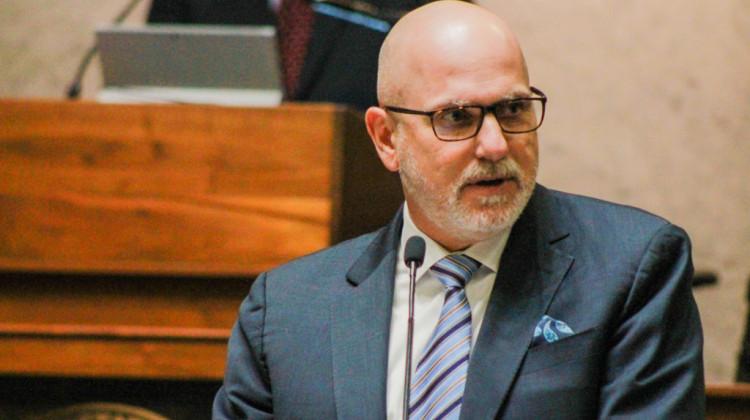
The average drug price increase from 2022 to 2023 was 15%, according to the United States Department of Health and Human Services.
Etactics / UnsplashThe cost of drugs in the U.S. continues to skyrocket. The average drug price increase from 2022 to 2023 was 15%, according to the United States Department of Health and Human Services. Some federal agencies say big pharma plays a role in keeping drug prices high for Americans.
Lizzy McGrevy, Side Effects Public Media’s community engagement specialist, spoke with Health Reporter Elizabeth Gabriel about why it’s difficult to lower drug costs.
This transcript has been edited for length, style and clarity.
Lizzy McGrevy: So, I’ve seen in the news, just a few weeks ago, that the Federal Trade Commission (FTC) took a rare step. It sent warning letters to drugmakers, saying the companies are abusing the system by filing what it called “junk patents” for their drugs — Can you help us understand what this means?
Elizabeth Gabriel: So, drug patents in the U.S. last for 20 years. And the Food and Drug Administration keeps track of those patents in something known as the Orange Book.
McGrevy: So what exactly is the orange book?
Gabriel: The Orange Book has a list of the drugs and patents that the FDA deems safe and effective. As long as those patents are in place, pharma companies get to choose the price for the drug without competition. Drug makers say that’s necessary because they pour millions and millions of dollars into cutting edge research and drug development. After these patents expire, competitors, like generic drug manufacturers, can eventually join the market and typically offer the drug at a much lower price for consumers.
But now, the FTC says drugmakers are gaming the system by filing what it described as “junk patents”. Those are patents that don’t really protect intellectual property or the innovation in how a drug is made – the FTC says drugmakers use them to extend their exclusive rights to the drug and prevent generic manufacturers from entering the market.
McGrevy: What about generic drug makers –– can’t they sue the original pharma companies so they can get on the market faster?
Gabriel: Yes. But that costs a ton of money and time. So, they end up waiting out the patent and that can take years.
McGrevy: Can you give us an example of these junk patents?
Gabriel: For example, some drug makers would file patents for injection devices that are used to administer medications instead of the actual drug. Or when their initial patent is close to expiring, they make a very slight change to the dosage or the formulation of their drug. But the changes aren’t innovative enough to warrant claims that their intellectual property is being stolen. So, in case of an asthma drug, they would change the plastic or canister of the inhaler.
McGrevy: Okay, wow. So, how has this been happening? Aren’t there any guardrails in the system?
Gabriel: Lizzy, there just isn’t a strong federal accountability system filtering through patents. Robin Feldman, a professor who studies health care law at the University of California San Francisco, said it’s a regulatory problem, in the sense that no one is minding this store.
“The Patent and Trademark Office doesn't care whether something is useful, or whether it's just being patented for an anticompetitive reason,” Feldman said. “The FDA does not consider itself a competition agency. The FDA says, ‘Our our job is just [to] decide whether it's safe and effective. Competition –– that's not really our stuff.’ The Federal Trade Commission for the first time is stepping in and saying, ‘Okay, fine, we'll do some of this stuff,’ but they're overburdened and have bigger fish to fry. And they don't really have the inside view of what's happening at the FDA.”
McGrevy: So, how have drugmakers responded?
Gabriel: Some drug companies have actually removed their junk patents from the FDA’s Orange Book and that’s led to improvements in terms of how much patients pay for asthma drugs for example. But other companies argue that the FTC’s accusation that their patents are junk isn’t accurate.
McGrevy: So, what’s next?
Gabriel: If drug manufacturers don’t remove their junk patent listings, they’ll open themselves up to antitrust lawsuits, and those can be pretty expensive.
But the FTC hasn’t announced if and when this would happen.
McGrevy: Thank you for the great information.
If you have any questions about our healthcare system, questions you’re too shy to ask your doctor, or other health questions, please reach out to us. We’ll be back with more health information at your next Checkup. Stay safe.
The Checkup by Side Effects Public Media is a regular audio segment on WFYI's daily podcast, WFYI News Now.
Side Effects Public Media is a health reporting collaboration based at WFYI in Indianapolis. We partner with NPR stations across the Midwest and surrounding areas — including KBIA and KCUR in Missouri, Iowa Public Radio, Ideastream in Ohio and WFPL in Kentucky.
Copyright 2024 Side Effects Public Media. To see more, visit Side Effects Public Media.
 DONATE
DONATE







 Support WFYI. We can't do it without you.
Support WFYI. We can't do it without you.